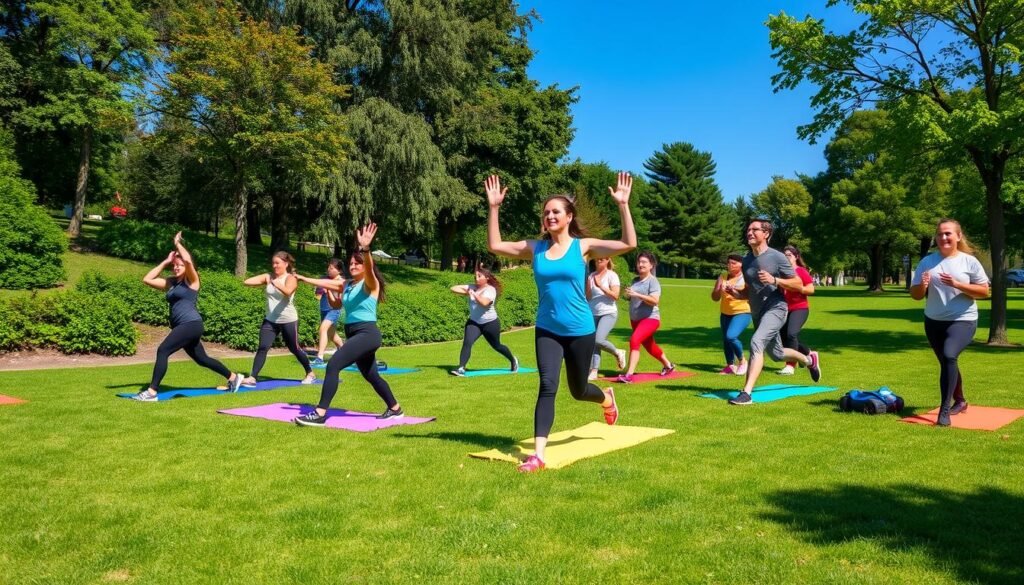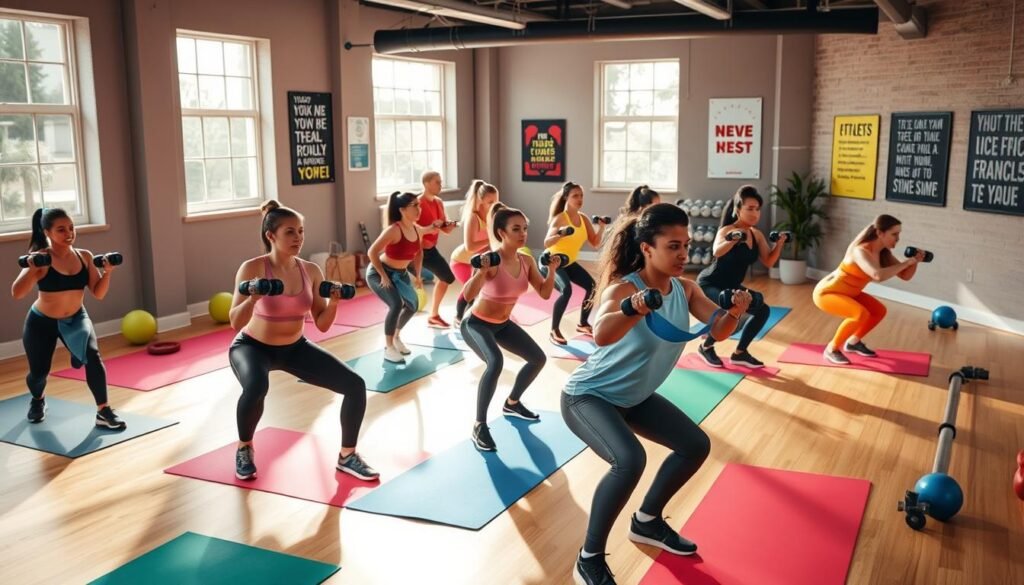Welcome to your journey towards better health! We’re diving into top exercise tips for all fitness levels. Working out regularly is key to a healthier life. The perks aren’t just physical.
You’ll see mental benefits and even make new friends by staying active. This guide is packed with fitness advice. It’s designed to help you confidently manage your fitness path.
Key Takeaways
- Regular exercise leads to improved mental health.
- Physical activity plays a vital role in overall health benefits.
- Setting realistic fitness goals is essential.
- Choosing enjoyable activities increases adherence to workout routines.
- Integrating exercise into daily life can enhance well-being.
- Outdoor workouts can provide unique advantages.
Understanding the Benefits of Physical Activity
Being active is key to boosting overall well-being. It helps more than just our fitness levels. Knowing all the ways it can help may encourage people to be more active every day.
Improved Mental Health
Keeping fit does wonders for your mind. It can ease anxiety and depression. This is because exercise releases endorphins, which make you feel better.
Trying out running, walking, or yoga can boost your mental health. These activities make you feel good about your achievements.
Physical Health Benefits
Exercise brings many health perks. It helps with keeping a healthy weight, boosts heart health, and makes muscles and bones stronger. An active life can lower the risk of serious problems like obesity and heart disease.
The link between staying active and better health is strong. It pushes us to keep moving.
Social Benefits of Staying Active
Being active also improves your social life. Joining group activities or sports can help you meet people and make friends. These social connections can inspire you to stick with your fitness goals.
Social interactions through fitness enhance life’s joy. They show the value of staying active for a balanced life.
Finding Your Motivation to Exercise
It can be tough to keep up with exercise, but it gets easier when you set goals. It’s key to establish goals that are real and achievable. This gives you a clear aim and makes you more likely to succeed.
Setting Realistic Goals
Start by making goals that are specific, measurable, achievable, relevant, and time-bound (SMART). These types of goals make sure your targets are realistic. For instance, you could:
- Exercise for 30 minutes, three times a week.
- Try to do five more step-ups or push-ups each week.
- Aim to run in a local 5k within six months.
If things change, it’s okay to adjust your goals. Checking on your progress often keeps you motivated. It also helps you get better over time.
Tracking Your Progress
Keeping track of your progress can really boost your motivation. There are lots of tools out there to help you monitor your achievements. You might want to try:
- Fitness Apps: These apps let you record your workouts and see your progress.
- Journals: Writing things down helps you recognize what you’ve achieved and overcome challenges.
- Wearable Devices: These gadgets give you live updates on how much you’re moving and calories you’re burning.
By using these tools, you’ll be better at tracking your progress. This enhances your motivation to exercise. Mixing goal setting with tracking your progress keeps you excited about staying fit.
Exercise Tips for Beginners
Starting an exercise routine is rewarding. For newcomers, it’s key to grasp the basics for a long-lasting routine. This guide provides useful tips to start exercising safely and effectively.
Starting Slowly
One critical tip for beginners is to start at a slow pace. It’s crucial to gently ease into workouts. Begin with exercises that are easy on your body. This reduces injury risks and builds endurance gradually.
Choosing the Right Activities
Finding enjoyable activities is key to sticking with exercise. It could be walking, swimming, or yoga. Choose fun and enjoyable exercises. This makes your fitness journey pleasurable and helps you keep at it.
Listening to Your Body
Listening to your body is crucial. Notice how you feel during and after workouts. If you feel tired, in pain, or uncomfortable, it might be time to rest or change your routine. Recovery is key for better performance and avoiding burnout or injuries.

Creating Effective Workout Routines
Creating workout plans that mix cardio and strength gives you a complete fitness package. It’s key for better endurance, muscle, and health. Whether starting or upgrading your fitness, knowing how to mix your activities keeps it fun and effective.
Balancing Cardio and Strength Training
For the best fitness outcomes, blend cardio and strength exercises weekly. Cardio, like running or swimming, is great for your heart and calorie-burning. Strength workouts, using weights or bands, grow muscle and up your metabolism. Pairing at least two strength days with cardio keeps you strong without getting tired.
Sample Weekly Workout Plan
Here’s a weekly workout plan for all fitness levels. Adjust it based on what you can do and enjoy.
| Day | Activity | Duration |
|---|---|---|
| Monday | Cardio (Running or Cycling) | 30 minutes |
| Tuesday | Strength Training (Upper Body) | 45 minutes |
| Wednesday | Cardio (Swimming) | 30 minutes |
| Thursday | Strength Training (Lower Body) | 45 minutes |
| Friday | Cardio (HIIT) | 20 minutes |
| Saturday | Strength Training (Full Body) | 45 minutes |
| Sunday | Rest or Light Activity (Walking or Yoga) | 30 minutes |
Cardio Exercise Recommendations
Cardio exercise is key for a healthy lifestyle. To enjoy it, mix in different fun activities. Trying varied exercises helps keep you motivated. It also makes working out more fun.
Fun Ways to Get Your Heart Pumping
- Dancing: Join a local dance class or follow online tutorials for styles like Zumba or hip-hop.
- Cycling: Explore scenic bike trails in your area or join a group cycling class for a social experience.
- Group Classes: Participate in community classes such as kickboxing, aerobics, or spinning.
- Hiking: Discover nearby trails and enjoy the great outdoors while getting a great workout.
Optimal Duration and Frequency
The American Heart Association suggests 150 minutes of moderate activity or 75 minutes of intense activity weekly. This can be divided into:
| Activity Level | Duration per Session | Frequency per Week |
|---|---|---|
| Moderate | 30 minutes | 5 times |
| Vigorous | 25 minutes | 3 times |
It’s important to find the right mix of exercise length and how often you do it. This improves your fitness routine.
Tracking Cardio Progress
Watching your progress is motivating when you follow cardio recommendations. Here are ways to keep track:
- Use a fitness tracker or smartwatch to monitor heart rate and calories burned.
- Maintain a workout journal to log distance and time for varying activities.
- Take note of your overall endurance by recording how long you can sustain a faster pace.
- Participate in fitness challenges with friends or online communities to celebrate achievements.
Incorporating Strength Training Tips
Strength training isn’t just about building muscles. It boosts your metabolism, strengthens bones, and increases overall power. Beginners can start with simple exercises. These won’t be too hard. Here are some top tips and easy exercises to kick off your strength training journey.
Benefits of Strength Training
- Increased Muscle Mass: With regular workouts, expect better muscle tone and size.
- Enhanced Metabolism: More muscle means a faster metabolic rate, helping in lose weight control.
- Improved Bone Health: Strength training can make your bones denser, preventing osteoporosis.
- Enhanced Functional Abilities: It makes daily tasks easier and safer.
Beginner-Friendly Strength Exercises
Here are exercises that beginners can easily add to their workouts:
| Exercise | Description | Repetitions | Equipment Needed |
|---|---|---|---|
| Bodyweight Squats | A great lower body workout for the quads, hamstrings, and glutes. | 10-15 | None |
| Push-Ups | Works on the chest, shoulders, and triceps. Can be done on knees for easier effort. | 5-10 | None |
| Dumbbell Rows | This exercise will strengthen your back and biceps as you pull weights towards you. | 10-12 | Dumbbells |
| Planks | A core exercise. Keep your body in a straight line from head to heels. | 20-30 seconds | None |
| Glute Bridges | Targets glutes and lower back. Lift your hips off the ground. | 10-15 | None |

Maintaining Healthy Habits in Daily Life
Making healthy choices daily might seem hard. But including exercise smoothly into your day helps. Stay active and eat well for lasting wellness.
Integrating Exercise into Your Routine
It’s important to make time for exercise to live healthier. Look at your daily plans to find chances to move more. Simple changes include:
- Walking during lunch breaks
- Taking the stairs instead of the elevator
- Scheduling workout sessions like any meeting
These changes keep you active without making your day tough.
Staying Active Throughout the Day
To keep moving, mix mini-exercises with your daily jobs. You can:
- Do stretching exercises while watching TV
- Practice desk stretches during work hours
- Engage in household chores that require physical exertion
Adding these steps boosts your activity, making healthy habits easier.
Healthy Eating and Nutrition
A balanced diet boosts your exercise and sets up a healthy routine. Focus on:
- Consuming fruits and vegetables daily
- Incorporating lean proteins into meals
- Staying hydrated with plenty of water
Choosing nutritious meals helps with workout recovery and is key to fitness.
| Healthy Eating Tips | Benefits |
|---|---|
| Eat whole grains | Provides sustained energy for workouts |
| Limit processed foods | Reduces unhealthy fats and sugars |
| Plan meals and snacks | Helps avoid unhealthy choices |
| Practice portion control | Aids in maintaining a healthy weight |
Staying Active: Outdoor vs Indoor Workouts
Being active can be fun whether you do it outside or inside. Each has its own perks for your body and mind. Knowing the difference helps you choose what’s best for you.
Benefits of Outdoor Activities
Outdoor activities let you enjoy nature and fresh air. When you hike, cycle, or run, it’s good for your heart and happiness. You get more vitamin D from the sun, which is key for your health.
The view keeps changing, which makes things exciting. This keeps you motivated to stay on the move.
Indoor Workouts for All Weather
Indoor workouts mean you can exercise no matter the weather. Working out at home or a gym fits easily into your day. It’s simple to keep up a routine, so you stay fit all year.
You can try many different exercises because of all the gear in fitness centers. This ensures your fitness plan covers everything.
Conclusion
Starting a fitness journey might seem scary at first. Yet, by following the exercise tips in this article, you can change your path for the better. It’s key to have a mix of cardio and strength exercises. This boosts both your body and mind.
Even little changes can make a big difference over time. You might like working out outside or inside. What matters most is you keep at it regularly and enjoy your exercises. Making your workout fit your life is crucial for success that lasts.
Ready to begin? Set your goals and stay on track. If you keep a positive attitude and work hard, you’ll see great results. Let fitness be a happy part of your day-to-day life. Enjoy every step of this journey!
